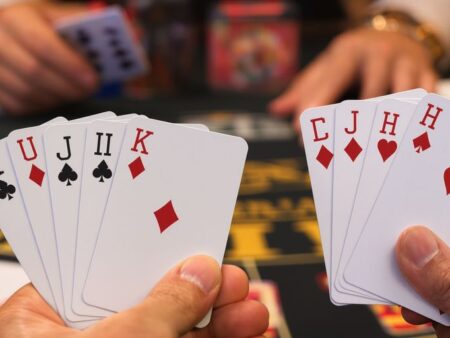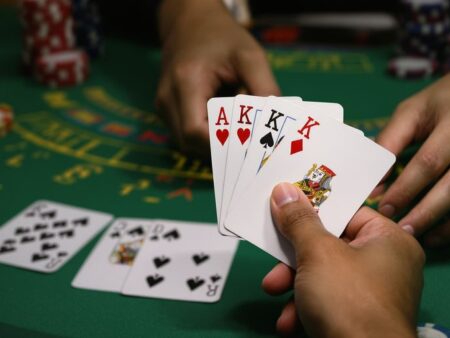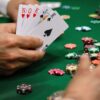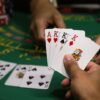Playing poker online can be a blast, but it also comes with its own set of challenges, especially when it comes to keeping your cool. You know, those moments when a bad beat or a losing streak just sends you off the rails? That’s tilt, and it can seriously mess with your game and your wallet. This article is all about how to manage tilt in online casinos, helping you stay sharp and make better decisions, no matter what the cards throw at you. We’ll cover everything from understanding why tilt happens to practical ways you can fight it.
Key Takeaways
- Understand that online poker has unique triggers for tilt due to speed, anonymity, and multi-tabling, making emotional control even more vital.
- Develop a growth mindset to view setbacks as learning opportunities rather than personal failures, focusing on good decisions over immediate results.
- Manage your bankroll and emotional risk by playing within your limits and separating poker funds to prevent financial stress from fueling tilt.
- Implement a tilt-resistant routine, including pre-session preparation and post-session reviews, to build mental toughness and identify personal triggers.
- Utilize cognitive behavioral techniques like identifying and reframing negative thoughts, and practice mindfulness and taking strategic breaks to maintain composure.
Understanding Tilt in Online Casinos
Online casinos present a different kind of challenge when it comes to keeping your cool. It’s easy to get caught up in the game when you’re just clicking buttons at home, right? Unlike a live casino where you have to physically get up and walk away, online, you can just keep playing, hand after hand, even when things aren’t going your way. This makes it way too simple to fall into a tilt spiral.
The Unique Challenges of Online Play
Online poker moves at a breakneck speed. You’ll see way more hands per hour compared to a live game. That means more chances to win, sure, but also more opportunities for those frustrating bad beats to happen. Plus, there are no tells to read, no faces to see getting upset. It’s just you and the screen. And don’t even get me started on multi-tabling – playing on several tables at once. It ramps up the variance and can send your emotions all over the place in a really short time. The chat box can also be a real problem, with players sometimes trying to get under your skin after they win a pot. It’s a whole different ballgame.
Recognizing the Signs of Tilt
So, how do you know if you’re actually tilting? It’s not just about losing. It’s about how you react to losing. Are you playing way more hands than you normally would? Are you making bigger bets or raises without really thinking it through? Maybe you’re calling bets you’d normally fold because you’re trying to
Cultivating a Growth Mindset for Resilience
It’s easy to get stuck thinking that if you lose a big pot or have a bad session, it means you’re just not good enough. This is what we call a fixed mindset. You believe your abilities are set in stone, and bad results are proof of your limitations. But that’s not really how poker works, or frankly, how anything worthwhile works.
Shifting to a growth mindset means you see every hand, every session, as a chance to learn and get better. It’s about understanding that setbacks aren’t personal failures, but just part of the process. Think about it: did you learn more from that time you won a bunch of easy pots, or from that brutal cooler that cost you a stack? Probably the cooler, right? Because you had to figure out how to deal with it.
Shifting from Fixed to Growth Thinking
Instead of thinking, “I’m just unlucky today,” try to reframe it as, “Okay, variance is happening. What can I control right now?” It’s about focusing on what you can influence – your decisions, your reactions, your effort – rather than dwelling on what you can’t, like the cards you’re dealt or what your opponent hits on the river.
Embracing Setbacks as Learning Opportunities
Every bad beat, every misplayed hand, is a data point. It’s information telling you where you might be going wrong or what you need to study more. If you lost a big pot because you made a mistake, don’t just get mad. Figure out what the mistake was. Was it a pre-flop decision? A post-flop read? Understanding the why behind the loss is way more valuable than just feeling the sting of losing.
Focusing on Decisions, Not Just Outcomes
This is a big one. You can make a mathematically perfect decision and still lose. That’s poker. Conversely, you can make a terrible, gut-feeling decision and get lucky. If you only judge your play based on whether you won or lost the pot, you’re going to get frustrated a lot. Instead, focus on whether you made the best possible decision with the information you had at the time. That’s the real measure of skill, and it’s what leads to long-term success.
Mastering Your Bankroll and Emotional Risk

Managing your money and your feelings at the poker table go hand-in-hand. If you’re playing with money that makes you anxious when it’s on the line, you’re basically setting yourself up for a rough time. It’s like trying to drive a car with the emergency brake on – you’re just not going to perform your best.
Playing Within Your Financial and Emotional Limits
This is pretty straightforward, really. You need to figure out what stakes you can play without feeling that gut-wrenching panic when you lose a buy-in. A good rule of thumb is to have enough money set aside for poker so that losing a few buy-ins doesn’t mess up your rent payment or your grocery budget. If losing a few hundred dollars makes you sweat, you’re probably playing too high. It’s not about how much you can win, but how much you can afford to lose without it impacting your life. This also means being honest about your emotional state. If you’re already stressed or upset about something else, jumping into a high-stakes game is probably a bad idea. Your emotional limits are just as important as your financial ones.
Separating Poker Funds for Stability
Think of your poker money like it’s for a separate business. You wouldn’t mix your personal savings with your business account, right? Same idea here. Keep your poker bankroll completely separate from your everyday checking and savings accounts. This makes it way easier to track your progress and, more importantly, prevents you from dipping into your poker funds when you need cash for something else, or vice-versa. It creates a buffer. When you see that poker account balance, you know that’s purely for the game, and it helps you make more rational decisions about when to play and at what stakes. It’s a practical step that really helps keep your head in the game.
Minimizing Emotional Volatility Through Stakes
Playing at stakes that are too high for your bankroll or your current emotional state is a fast track to tilt. If you’re constantly worried about losing your next buy-in, every decision gets harder. You might start playing too tight, avoiding risks even when they’re mathematically sound, or you might overreact to bad beats because the money lost feels significant. By choosing stakes that feel comfortable – meaning a loss won’t send you into a tailspin – you reduce that constant background anxiety. This allows you to focus on making the best possible decisions based on the cards and your opponents, not on your fear of losing money. It’s about creating a stable environment where your emotions aren’t constantly hijacking your thought process. When you’re not stressed about the money, you can actually play your best game.
Developing a Tilt-Resistant Poker Routine
Building a solid routine around your poker sessions can make a huge difference in how you handle those inevitable tough spots. It’s not just about the cards you’re dealt; it’s about how you prepare your mind before you even sit down at the virtual felt. Think of it like an athlete getting ready for a big game – they have their rituals, their warm-ups. Poker players need that too, just in a mental sense.
Establishing Pre-Session Mental Preparation
Before you click that first button, take a few minutes to get your head in the game. This isn’t just about opening up your poker client. It’s about setting intentions. Remind yourself that poker is a long-term game. You’re going to have winning sessions and losing sessions, and that’s totally normal. What matters most is making good decisions consistently, not whether you win or lose a single hand or even a single session. Also, acknowledge that variance is a real thing. Bad beats happen to everyone, even the best players. They don’t mean you’re cursed or that the game is rigged. They just mean that sometimes, the dice roll in an unexpected way. The key is to remember that you control your reactions. Tilt is a choice, and you can choose to step back, reframe your thoughts, and get back in control. This mental reset can prevent a lot of potential tilt before it even starts.
Building Habits for Long-Term Mental Toughness
Mental toughness isn’t something you’re just born with; it’s built over time through consistent habits. Think about things outside of poker that can help. Getting enough sleep is huge. When you’re tired, you’re way more likely to get frustrated and tilt. Regular exercise also helps a lot with managing stress and keeping your emotions in check. Even just a few minutes of mindfulness or meditation each day can train your brain to stay calmer and more focused, especially when things go south at the tables. Finding someone to talk to, like a poker buddy or a coach, can also be super helpful. Sharing your experiences and getting an outside perspective on tilt moments can keep you more objective.
The Importance of Post-Session Reviews
Once your session is over, don’t just close the client and forget about it. Take a few minutes to review what happened, especially if you felt yourself getting frustrated. Ask yourself a few questions: What specifically triggered that feeling of tilt? How did I react to it? What could I have done differently to handle that situation better? Did I stick to my game plan, or did I start making emotional decisions? Looking back honestly, without judgment, helps you identify your personal tilt triggers and develop strategies to avoid them in the future. It’s like reviewing game film for any sport – it’s where the real learning happens.
Cognitive Behavioral Therapy for Tilt Management

Tilt isn’t just about losing a big pot; it’s about how your brain processes that loss and the emotional spiral that follows. Two players can get the exact same bad beat, and one just shrugs it off, while the other goes on a tilt-fueled rampage. The difference? Their thought patterns.
Cognitive Behavioral Therapy, or CBT, is a really practical way to tackle this. It’s all about changing how you think to change how you feel and act. In poker, this means spotting those automatic, irrational thoughts that mess with your head and lead to bad decisions.
Identifying Cognitive Distortions
These are basically mental errors that keep you stuck in a negative loop. Some common ones in poker include:
- Black-and-White Thinking: Seeing things as all good or all bad. Like thinking, "I either win this hand, or I’m a total failure." In reality, poker is a long game, not just one hand.
- Catastrophizing: Blowing things out of proportion. "I’ll never recover from this downswing." Downswings are normal; they don’t predict your future.
- Personalization: Taking things too personally. "The poker gods are out to get me." Poker is math, not a personal vendetta.
- Emotional Reasoning: Letting feelings dictate reality. "I feel frustrated, so I must be playing terribly." Your feelings don’t always match the facts of your play.
It helps to keep a journal. When you feel that frustration bubble up, jot down what happened and what thought popped into your head. Spotting these patterns is the first step to breaking them.
Challenging and Reframing Tilt-Inducing Thoughts
Once you catch a distorted thought, you need to question it. Ask yourself:
- What evidence actually supports this thought?
- What evidence goes against it?
- What would I tell a friend if they had this same thought?
For instance, if you think, "I always get unlucky against bad players," try reframing it to something like, "Recreational players make mistakes, and those mistakes are what make me money over time." Or if you think, "I lost a big pot, I need to win it back NOW," reframe it to, "Chasing losses is a bad idea. The best move is to stick to good decisions or take a break."
Applying CBT Principles to Poker Situations
Before you even sit down to play, take a moment to reset your thinking. Remind yourself that poker is a long-term game. You’ll have ups and downs, but consistent good decisions are what matter. Bad beats happen to everyone; they’re just variance. And most importantly, you control your reactions. Tilt is a choice, and you can choose to step back, reframe, and get back in control. By understanding how your thoughts affect your emotions, you can start to break the tilt cycle and make better decisions, even when things aren’t going your way.
Practical Techniques to Avoid Tilt
Sometimes, you just need a few concrete things to do when you feel that familiar frustration creeping in. It’s not about being perfect, but about having a plan when things get tough. These techniques are like little tools you can pull out of your pocket to stop yourself before you go off the rails.
Implementing the ‘Stop and Think’ Technique
This is pretty straightforward. When you’re faced with a decision, especially a big one or one where you’re already feeling a bit antsy, just… stop. Don’t click that button immediately. Take a breath. Count to five, maybe ten. Think about what you’re about to do. Is it the mathematically sound play? Or is it a reaction to something that just happened? Pausing gives your rational brain a chance to catch up with your emotional one. It’s amazing how much clarity a few seconds of stillness can bring.
Using a Personal ‘Tilt Switch’ Phrase
This is a bit like a mental emergency brake. You need a word or a short phrase that you can repeat to yourself, either out loud or in your head, the moment you feel tilt starting. Something simple, like “Stay calm,” “Play the player,” or even just “Next hand.” The key is that it’s personal to you and that you’ve practiced using it. When you catch yourself getting angry or making a bad decision out of frustration, say your phrase. It’s meant to interrupt that negative thought spiral and bring you back to the present moment, reminding you to focus on good play.
Creating Decision-Making Checklists
For those really tricky spots, or even just as a general guide, having a quick checklist can be super helpful. It forces you to consider the important factors before you act. You could have something like this:
- What hands could my opponent realistically have here?
- How does my current action look from their point of view?
- Am I making this play because it’s the best strategic move, or because I’m feeling something?
It’s not about overthinking, but about making sure you’re not just blindly clicking buttons. It’s a way to ensure you’re playing with intention, not just reaction.
The Effective Use of Breaks

Taking breaks isn’t just about stepping away from the screen; it’s a strategic move to keep your head in the game. Online play moves fast, way faster than live games, and you can see a lot more hands in an hour. That means more chances for things to go wrong, like hitting a bad beat or just having a rough run. Without seeing your opponents’ faces, it’s easy to lose touch with your own emotions, and before you know it, you’re clicking buttons without really thinking. Multi-tabling, which is a big thing online, can really mess with your head too, making those emotional swings happen even quicker.
Scheduling Regular Mental Resets
Think of breaks like pit stops in a race. You need them to keep performing. Aim for a short 5-10 minute break every hour, no matter how well you think you’re doing. This helps you stay sharp and keeps those emotions from getting out of hand. It’s easy to get caught up in just one more hand, especially when you’re online, but setting a timer is a good way to force yourself to step back.
Utilizing Breaks for Physical and Mental Rejuvenation
When you take a break, actually take a break. Get up, walk around, stretch. Even a quick walk outside can do wonders for clearing your head and shaking off any tension. Simple things like deep breathing exercises can also help calm your system down fast. Try something like box breathing: inhale for four, hold for four, exhale for four, hold for four. It sounds simple, but it really works to reset your nervous system.
Implementing "Stop-Loss" for Emotional Control
This is where you set limits, not just for your money, but for your emotions. If you start feeling that familiar frustration creep in, that’s your signal to stop. Step away for at least 15 minutes, maybe longer. Some players even have rules like not playing again if they react badly to a big loss. It’s about recognizing when your emotions are starting to take over your decisions and having a plan to stop it before it gets worse.
Reframing Negative Thoughts and Beliefs
Sometimes, after a rough session, our brains just go into overdrive with all sorts of negative thoughts. It’s like a runaway train, and if we don’t stop it, it’s going to derail our entire game. These thoughts aren’t usually based on reality; they’re more like distorted, automatic reactions that feed into that emotional spiral, leading us to make some really bad decisions.
Replacing ‘Always’ and ‘Never’ Thinking
One common trap is thinking in absolutes. You know, like "I always get bad cards" or "I never win a flip." This kind of thinking is rarely true. Poker is a game of probabilities and long-term results, not just what happens in one session. When you catch yourself using "always" or "never," try to challenge it. What’s the actual evidence? Did you really never win a flip? Or did you win some, but you’re just focusing on the losses because they feel worse?
- Challenge the absolute: Ask yourself, "Is this really true 100% of the time?"
- Look for counter-evidence: Think of times when the opposite was true.
- Reframe: Instead of "I never get good cards," try "Variance means I’ll have streaks of good and bad cards, and I need to play my best regardless."
Challenging Catastrophizing and Personalization
Catastrophizing is when you blow things out of proportion, like thinking "This downswing will ruin me" after a few losing sessions. Personalization is when you feel like everything is happening to you personally, as if the poker gods are out to get you. Neither of these is helpful. Downswings are a normal part of poker. And the cards don’t care about you; they’re just random.
- Catastrophizing: "This downswing is going to bankrupt me." -> "Downswings are normal. I’ll focus on playing well and managing my bankroll, and I’ll get through this."
- Personalization: "The dealer is giving me bad cards on purpose." -> "The cards are random. My focus should be on making good decisions with the cards I’m dealt."
Understanding Emotional Reasoning in Play
Emotional reasoning is basically letting your feelings dictate your reality. If you feel like you’re playing badly, you might conclude that you are playing badly, even if your decisions have been sound. Or if you feel frustrated, you might think "I must be losing because I’m playing terribly." Your emotions are signals, but they aren’t always accurate reflections of the game’s reality. It’s important to separate how you feel from how you’re actually playing.
- Acknowledge the feeling: "I feel frustrated right now."
- Check the facts: "Did I make good decisions in the last few hands? Did I get unlucky?"
- Reframe the thought: "Even though I feel frustrated, my decisions were solid. I’ll stick to my plan."
Building Long-Term Mental Fortitude

Building mental toughness in poker isn’t about never feeling frustrated; it’s about how you handle that frustration when it inevitably shows up. Think of it like training for a marathon – you don’t just show up and run 26 miles. You build up to it, and you learn to push through the tough spots. The same applies to your poker game. You need to develop habits and a mindset that can withstand the natural ups and downs of variance.
Improving Emotional Regulation Through Mindfulness
Mindfulness is basically paying attention to what’s happening right now, without judging it. In poker, this means noticing when you start to feel that familiar heat of tilt creeping in. Instead of immediately reacting, you acknowledge it. "Okay, I’m feeling annoyed because I just lost that pot." This simple act of noticing can create a little space between the feeling and your actions. It gives you a chance to choose a better response. Even just a few minutes of deep breathing before a session, or focusing on your breath when you feel a bad beat coming on, can make a big difference. It trains your brain to stay calm and focused, even when things aren’t going your way.
Seeking Support from Accountability Partners
Sometimes, you just need someone else to talk to about your game, especially the mental side. Finding a poker buddy or a coach who understands the grind can be super helpful. You can discuss those tough sessions, those hands that made you want to throw your computer, and get an outside perspective. They can help you spot when you’re starting to tilt, or remind you of your goals when you’re getting too caught up in short-term results. It’s like having a built-in support system that keeps you honest and on track. Sharing your struggles and successes with someone who gets it makes the whole process less isolating and helps you stay accountable to your own improvement.
Developing a Consistent Mental Game Routine
Just like you have a pre-game warm-up for physical sports, you need a mental game routine for poker. This isn’t just about showing up and playing. It’s about preparing your mind for the challenges ahead. This could include:
- Pre-session preparation: Maybe it’s reviewing your goals for the session, doing a quick mindfulness exercise, or even just listening to some pump-up music. The idea is to get into a focused, positive state before you even open the software.
- During-session habits: This might involve taking short breaks every hour, consciously checking in with your emotional state, or using a specific phrase to remind yourself to stay calm if you feel tilt starting.
- Post-session review: This is huge. After you finish playing, take a few minutes to think about how you handled yourself mentally. What went well? What could have been better? Did you tilt? If so, why? What can you do differently next time? This reflection is where a lot of the long-term mental growth happens. It turns every session, good or bad, into a learning opportunity.
Case Studies and Professional Insights
Looking at how the pros handle the pressure can teach us a lot about managing tilt. These players often deal with huge swings and tough spots, and their strategies for staying cool are pretty insightful.
Learning from Professional Players’ Experiences
Many top players, like Daniel Negreanu, are known for their calm reactions even after a bad beat. Instead of getting visibly upset, they might take a breath and move on. This ability to reset quickly is key. Phil Ivey, for instance, keeps a consistent poker face, making it hard for opponents to read him, which is a form of emotional control in itself. Maria Konnikova, with her background in psychology, really emphasizes how understanding our own mental biases helps avoid tilt. It’s not just about playing cards; it’s about playing your mind.
Here are some traits common among successful players:
- Emotional Regulation: Keeping feelings in check, especially after losses.
- Consistent Behavior: Not letting emotions change how they play.
- Psychological Awareness: Understanding how opponents think and react.
- Quick Recovery: Bouncing back from setbacks without dwelling on them.
Analyzing Psychological Edges in High-Stakes Games
In games with big money on the line, the mental game becomes even more important. Think about tournament bubble situations – the stress of potentially missing out on a payout can cause players to make mistakes. Those who stay focused and play their game, rather than playing scared, often do better. There are stories of players losing hundreds of thousands in a single hand but then continuing to play their best. This shows a professional mindset of treating each hand as a separate event, free from the emotional baggage of the last one.
Strategies for Maintaining Composure Under Pressure
One big takeaway from high-stakes play is the importance of breaks. When things get tough, pros often step away from the table to clear their heads. This isn’t just about resting; it’s about actively resetting their emotional state. Some players even have specific routines or phrases they use to snap themselves out of a tilt. It’s about having a plan for when things go wrong, not just when they go right. Learning to accept variance – the natural ups and downs of the game – is also a huge part of staying composed. It’s a marathon, not a sprint, and getting too emotional about short-term results just isn’t sustainable.
Keep Playing Smart, Stay in Control
So, we’ve talked a lot about what tilt is and why it’s such a big deal, especially when you’re playing online. It’s easy to get caught up in the frustration after a bad beat or a losing streak, but remember, those moments don’t define your game. By using the techniques we’ve covered, like taking breaks, reframing your thoughts, and sticking to a solid plan, you can really start to manage those emotional swings. It takes practice, for sure, but learning to control your reactions is a huge part of becoming a better player. Keep at it, stay focused on making good decisions, and you’ll find yourself winning more often in the long run.
Frequently Asked Questions
What exactly is tilt in poker?
Tilt is when you get upset or angry during a game, usually after something bad happens like losing a big hand. This anger makes you play worse and make bad choices.
How is online poker different from playing in a real casino when it comes to tilt?
Online poker is different because you can’t see other players, and games move faster. This can make it easier to get upset quickly and harder to calm down compared to playing in person.
What are some signs that I might be tilting?
Some signs are playing too fast, making risky bets you normally wouldn’t, or feeling really angry after losing. If you start blaming others or the game for your losses, that’s a big sign too.
Can you explain the thought-emotion-action cycle related to tilt?
It’s like a chain reaction. First, you have a bad thought (like ‘This is unfair!’). Then, you feel an emotion (like anger). Finally, you take an action (like making a bad bet). This cycle makes you play worse.
Are there specific ways of thinking that make tilt worse?
Yes! Thinking that you’re always unlucky or that you’re a bad player is called ‘black-and-white thinking’ or ‘catastrophizing.’ You can learn to change these thoughts into more positive and realistic ones.
How often should I take breaks during a game?
Taking short breaks, like 5-10 minutes every hour, helps a lot. It lets you clear your head and calm down before you make any bad decisions.
Is it important to have a ‘stop-loss’ for money when playing?
Yes, definitely. It’s smart to set a limit on how much money you’re willing to lose in a session. If you hit that limit, you should stop playing, even if you feel like you can win it back.
What does it mean to focus on decisions rather than just outcomes?
Focusing on making good choices instead of just winning or losing is key. Think about whether your decisions are smart, not just whether you won the hand. This helps you learn and improve over time.







